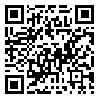Volume 36, Issue 142 (July 2023)
IJN 2023, 36(142): 142-157 |
Back to browse issues page
Download citation:
BibTeX | RIS | EndNote | Medlars | ProCite | Reference Manager | RefWorks
Send citation to:



BibTeX | RIS | EndNote | Medlars | ProCite | Reference Manager | RefWorks
Send citation to:
Bastani F, Esmaili S, Zandifar A, Haghani H. Fear of COVID-19 Among the Elderly Newly Diagnosed With Cancer Referred to Selected Hospitals Affiliated to Alborz University of Medical Sciences. IJN 2023; 36 (142) :142-157
URL: http://ijn.iums.ac.ir/article-1-3547-en.html
URL: http://ijn.iums.ac.ir/article-1-3547-en.html
1- Department of Community Health Nursing and Geriatric Nursing, School of Nursing and Midwifery, Iran University of Medical Sciences, Tehran, Iran. , Bastani.f@iums.ac.ir
2- Department of Community Health Nursing and Geriatric Nursing, School of Nursing and Midwifery, Iran University of Medical Sciences, Tehran, Iran.
3- Department of Medicine, School of Medicine, Alborz University of Medical Sciences, Karaj, Iran.
4- Department of Biostatistics, School of Health Sciences, Iran University of Medical Sciences, Tehran, Iran.
2- Department of Community Health Nursing and Geriatric Nursing, School of Nursing and Midwifery, Iran University of Medical Sciences, Tehran, Iran.
3- Department of Medicine, School of Medicine, Alborz University of Medical Sciences, Karaj, Iran.
4- Department of Biostatistics, School of Health Sciences, Iran University of Medical Sciences, Tehran, Iran.
Abstract: (2078 Views)
Background & Aims The present study aims to determine the fear of COVID-19 in the elderly newly diagnosed with cancer referred to selected hospitals affiliated to Alborz University of Medical Sciences.
Materials & Methods In this longitudinal study, 174 elderly people newly diagnosed with cancer referred to the selected hospitals participated, who were selected using a continus sampling method. To collect data, a demographic form, the Abbreviated Mental Test, and the 7-item fear of COVID-19 scale were used before diagnosis, one month after, and two months after. The data were analyzed in SPSS software, version 22.
Results Fear of COVID-19 level at the time of cancer diagnosis was moderate (mean score: 17.69±4.74). In the second stage (one month after the diagnosis), the mean score was 14.26±4.09. In the third stage (two months after diagnosis), the mean score was 11.81±4.13. Fear of COVID-19 at the time of cancer diagnosis was significantly different based on marital status (P=0.049), underlying diseases (P=0.014), and perception of health (P=0.004).
Conclusion Fear of COVID-19 can disrupt the process of treatment and chemotherapy in elderly patients with cancer. It is recommended to develop interventions to improve the mental health of the elderly with cancer during the pandemic.
Materials & Methods In this longitudinal study, 174 elderly people newly diagnosed with cancer referred to the selected hospitals participated, who were selected using a continus sampling method. To collect data, a demographic form, the Abbreviated Mental Test, and the 7-item fear of COVID-19 scale were used before diagnosis, one month after, and two months after. The data were analyzed in SPSS software, version 22.
Results Fear of COVID-19 level at the time of cancer diagnosis was moderate (mean score: 17.69±4.74). In the second stage (one month after the diagnosis), the mean score was 14.26±4.09. In the third stage (two months after diagnosis), the mean score was 11.81±4.13. Fear of COVID-19 at the time of cancer diagnosis was significantly different based on marital status (P=0.049), underlying diseases (P=0.014), and perception of health (P=0.004).
Conclusion Fear of COVID-19 can disrupt the process of treatment and chemotherapy in elderly patients with cancer. It is recommended to develop interventions to improve the mental health of the elderly with cancer during the pandemic.
Type of Study: Research |
Subject:
nursing
Received: 2022/02/24 | Accepted: 2023/06/22 | Published: 2023/07/1
Received: 2022/02/24 | Accepted: 2023/06/22 | Published: 2023/07/1
Send email to the article author
| Rights and permissions | |
 |
This work is licensed under a Creative Commons Attribution-NonCommercial 4.0 International License. |







